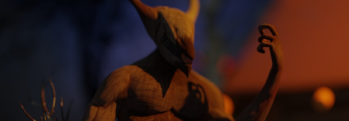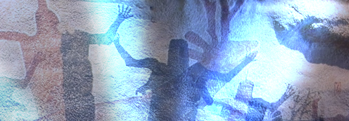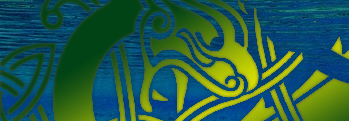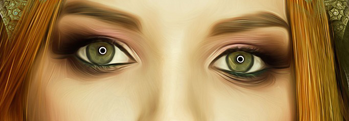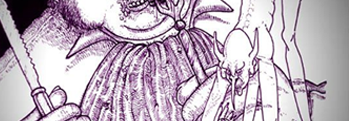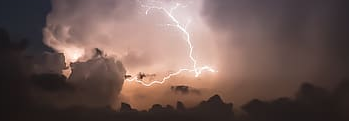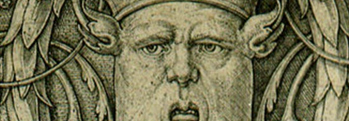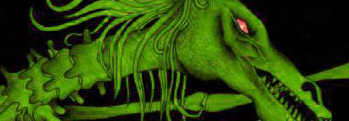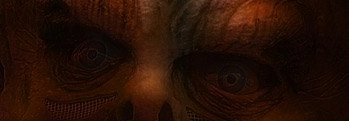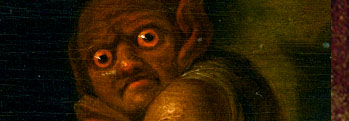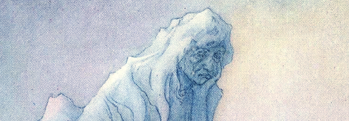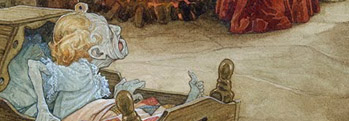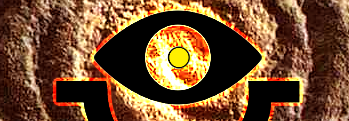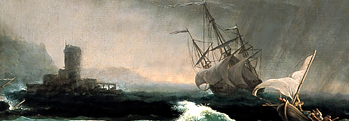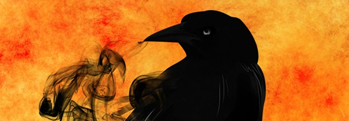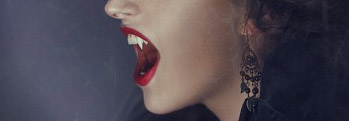Tales of the Merrow
Irish and Celtic myths and legends, Irish folklore and Irish fairy tales from Irish Gods and Monsters
The oceans of Ireland are wide but never empty - Tales of the Merrow
Old Jack Doherty was a kindly and good natured sort of fellow, as well he might be for he had chosen to live in a strange and desolate part of the country, by a coast of jagged rocks and sucking tides. And why might that be cause for merriment, you may ask? Well, it was many's the night and many's the storm that blew an unfortunate ship too close to the cliffs, whereupon she was torn asunder and her rich cargo scattered to the sea's embrace.
 Jack scooped up kegs of fine brandy and bales of fabrics, cotton and tobacco, good casks of whiskey and bottles of fine wines from places he couldn't pronounce, and why not, he thought, sure isn't the king rich enough? His bay was like a private brewery all to himself, and his nets never lacked for fish either! He supplied half the estates in the county and lived well from those proceeds too.
Jack scooped up kegs of fine brandy and bales of fabrics, cotton and tobacco, good casks of whiskey and bottles of fine wines from places he couldn't pronounce, and why not, he thought, sure isn't the king rich enough? His bay was like a private brewery all to himself, and his nets never lacked for fish either! He supplied half the estates in the county and lived well from those proceeds too.
His heart wasn't hard either mind you, he'd always sail out and help any drowning sailors he could find, or any that made it to shore were well looked after and sent on their way, dried out and fit.
So contrary to what might be expected on the face of it, he had no difficulty in finding himself a wife, and indeed Biddy Mahony lived as well as any and better than most, and made a proud appearance in the Church every Sunday.
As full as his life was, Jack had one desire that had never been fulfilled, and that was to meet a Merrow. The Merrow were the odd fishlike people who lived under the sea, and in all his years he'd never seen one, although his father and grandfather were well acquainted with the ocean folk. His grandfather was so close to them that he'd have brought one to mass, only for fear of vexing the priest! As often as not he'd sail out all day looking for one, for it was said that part of county Clare was well populated by them, and came back with no fish to show for his troubles, to face the wrath of Biddy.
Then one day he set out on in unusually rough weather, the seas were high and snapping, and he spied upon a distant rock what looked like a greenish figure wearing a cocked hat. Jack waited there, floating, and waited again but the figure didn't stir. Losing patience he let out a whistle, and startled, the figure leapt straight into the water, not to be seen again.
Knowing the way of it now, he went back to that rock when the wind was blowing hard and the sea was high as hills, and sure enough he spotted the same figure leaing in and out of the waves on those days. He took himself up to the rock for a closer look, and saw a green man with a fishtail for legs and short arms like fins, a red nose and small eyes like a pig. The hat woven of feathers was off its head and it seemed to be giving some serious matter deep thought.
Interrupting the cogitations, Jack boldly set foot on the rock and called out a greeting!
"Your servant, sir," said Jack.
"Your servant, kindly, Jack Dogherty," answered the Merrow.
"To be sure, then, how well your honour knows my name!" said Jack.
"Is it I not know your name, Jack Dogherty? Why man, I knew your grandfather long before he was married to Judy Regan, your grandmother! Ah, Jack, Jack, I was fond of that grandfather of yours; he was a mighty worthy man in his time: I never met his match above or below, before or since, for sucking in a shellful of brandy. I hope, my boy," said the old fellow, with a merry twinkle in his eyes, "I hope you're his own grandson!"
'Never fear me for that," said Jack; "if my mother had only reared me on brandy, 'tis myself that would be a sucking infant to this hour!"
"Well, I like to hear you talk so manly, you and I must be better acquainted, if it were only for your grandfather's sake. But, Jack, that father of yours was not the thing! he had no head at all."
"I'm sure, said Jack, "since your honour lives down under the water, you must be obliged to drink a power to keep any beat in you in such a cruel, damp, could place. Well, I've often heard of Christians drinking like fishes; and might I be so bold as ask where you get the spirits?"
"Where do you get them yourself, Jack?" said the Merrow, twitching his red nose between his forefinger and thumb.
And so Jack became good friends with the Merrow, and they talked for a while before the Merrow departed back to his undersea home. Several times they met again, and Jack learned his name was Coomara, until one day the Merrow arrived with a second hat tucked under his arm.
"Might I take the liberty to ask, sir," said Jack, "why your honour has brought the two hats with you today? You would not, sure, be going to give me one of them, to keep for the curiosity of the thing?"
"No, no, Jack," said he, "I don't get my hats so easily, to part with them that way. But I want you to come down and dine with me, and I brought you that hat to dive with."
"Lord bless and preserve us!" cried Jack, in amazement, "would you want me to go down to the bottom of the salt sea ocean? Sure, I'd be smothered and choked up with the water, to say nothing of being drowned! And what would poor Biddy do for me, and what would she say?"
"And what matter what she says, you pinkeen? Who cares for Biddy's squalling? It's long before your grandfather would have talked in that way. Many's the time he stuck that same hat on his head, and dived down boldly after me; and many's the snug bit of dinner and good shellful of brandy he and I have had together below, under the water."
"Is it really, sir, and no joke?" said Jack; "why, then, sorrow from me for ever and a day after, if I'll be a bit worse man nor my grandfather was! Here goes - but play me fair now. Here's neck or nothing!" cried Jack.
"That's your grandfather all over," said the old fellow; "so come along, then, and do as I do."
So saying he tossed the hat to Jack, who put it on the right way, and sprang into the waves. Jack closed his eyes and sprang after, grabbing hold of the Merrow's tail and vanishing under the ocean. It was a long journey through the deeps, and often Jack had second thoughts as the miles rolled by, but it was too late to turn back now.
They came at last to a silver wall, and falling through Jack was astonished to find himself on dry land at the bottom of the sea. They landed just in front of a nice house that was slated very neatly with oyster shells! The Merrow, turning about to Jack, welcomed him down. He looked about him and could see no living things, barring crabs and lobsters, of which there were plenty walking leisurely about on the sand. Overhead was the sea like a sky, and the fishes like birds swimming about in it.
Well Jack gabbled on in wonderment for a bit, as well he might, and then he joined the Merrow in his house for dinner, a fine luncheon was awaiting and two young Merrows cooking at the hearth where a fire blazed warmly. They ate and drank and supped of good vintages from delicate shells, and anon the Merrow took Jack to see his cellar. At the back of the room was a shadowed place, and the Merrow turned to Jack as if to whisper a secret, and whisper he did.
"Now Jack," he said, "would you like to see my Godsends?" And Jack went closer to see what looked like lobster pots arrayed on shelves at the back of the cellar. A chill took him then although he knew not why.
"Well, Jack, how do you like my Godsends?" said old Coo.
"Upon my oath, sir," said Jack, "they're mighty well worth the looking at. But might I make so bold as to ask what these things like lobster pots are?"
"Oh! the Soul Cages, is it?"
"The what? sir!"
"These things here that I keep the souls in."
"Arrah! what souls, sir?" said Jack, in amazement, "sure the fish have no souls in them?"
"Oh! no," replied Coo, quite coolly, "that they have not, but these are the souls of drowned sailors."
"The Lord preserve us from all harm!" muttered lack, "how in the world did you get them?"
 "Easily enough: I've only, when I see a good storm coming on, to set a couple of dozen of these, and then, when the sailors are drowned and the souls get out of them under the water, the poor things are almost perished to death, not being used to the cold. So they make into my pots for shelter, and then I have them snug, and fetch them home, and is it not well for them, poor souls, to get into such good quarters?"
"Easily enough: I've only, when I see a good storm coming on, to set a couple of dozen of these, and then, when the sailors are drowned and the souls get out of them under the water, the poor things are almost perished to death, not being used to the cold. So they make into my pots for shelter, and then I have them snug, and fetch them home, and is it not well for them, poor souls, to get into such good quarters?"
Jack was nonplussed and not a little disturbed, but they retired above for brandy in the kitchen until he felt it was time to go back as his wife Biddy would be getting concerned. Coo the Merrow took him outside then and put his hat on backwards, telling him that he'd pop up right back where he went in, but to cast the hat into the sea after. And so it was, and so Jack did.
He went home that night under the stars and spoke not a word of his adventures to Biddy, pondering deep on all he had seen. When next he met the Merrow then he proposed that the man of the sea might join him for dinner in return, knowing Biddy would be away that day, and the Merrow agreed cheerfully. "Don't fear for me Jack, I'll be there!" he said.
And on the day, Jack laid out a fine spread with the finest vintages he could find, but as much as the Merrow put away he never quite keeled over with it. Aha, thought Jack, I've just the thing!
Jack took care to have his own liquor well watered, and said, "Tell me, sir, did you ever drink any poteen? Any real mountain dew?"
"No," says Coo, "what's that, and where does it come from?"
"Oh, that's a secret," said Jack, "but it's the right stuff - never believe me again, if 'tis not fifty times as good as brandy or rum either!"
The Merrow took a sup, and it was the good stuff alright, a brazen drop with fine smack. The Merrow drank and sang and laughed and danced until he fell asleep on the floor snoring. Jack crept up and lifted the hat from his head, sprang up from his seat and soon came to the Merrow's home under the waves.
Not a person was in sight, only the crabs and lobsters making their way about their own business across the sand, so Jack went into the house to open the lobster pots in the back. As he did so he heard little chirps and whistles and was surprised, for the priests had told him that nobody could see or hear a soul, any more than they could see the wind. He said a prayer and blessed them on their journey, wherever they may go next.
And now he set the hat on his head backwards, but was confounded! The water above was too high to reach and he couldn't leap into it. He was puzzled until he spied a massive cod swimming above, and its tail dipped down low for a moment. Seizing his chance he grabbed the tail and was flipped up into the water, and so whizzed home in a flash.
As for home! Biddy had come back early and was upset to find all her poteen gone, thinking she'd married herself a drunkard, when she spotted the Merrow lying under the table and was aghast at the shape of him. Running from the house she was glad to hear Jack's cheery whistle as he ambled up the trail, and told her the whole story.
Despite this turn of affairs Jack and the Merrow remained good friends thereafter, and the Merrow never missed the souls, until one day Jack threw stones into the water in the usual way, but the Merrow never showed up. Jack supposed he had passed on or moved away, and that was that.
Although it is not certian, a wrecker's cove lay along the shores of county Clare as on the map.
More Irish Gods and Monsters
The Irish elk, or more properly deer, was the single largest species of deer which has ever existed. They were slightly larger than the modern moose, but their spread of antlers was vast - up to four meters or thirteen feet across in some specimens! These magnificent creatures roamed the plains and forests of Ireland and Europe before, during and a ... [more]
It was a fine day in Ireland many years ago when Fionn and his Fianna took a fancy to go out hunting. Warm was the sun amid the whispering glades of ancient forests, gentle was the breeze and sweet the scent of summer flowers in its bosom. Sweeter yet was the sight of a mighty deer to the eyes of the hunters, and so they gave chase, howling with de ... [more]
It is during the darkest winter nights that we sit inside our houses and listen to the wind hammering at our windows and doors, as if it had a mind and will of its own – as if it wished to do us harm! The old people of Ireland believed that was the literal truth, that there were demons of the air, or demna aeóir thronging about the ... [more]
No tale of ancient Ireland could be complete without mentioning the Fomorians, dreaded foes of the Tuatha Dé Danann and all who came to conquer Ireland. The meaning of their name is debated even today, although most agree that the first part, fó, means “from below” or “nether” and the latter part means “t ... [more]
The dragons of Ireland were not like the dragons of other places, since they did not have wings or often even claws, and only rarely did they breathe fire, if at all! The were called the Ollphéisteanna, which means “great worms” or “mighty reptiles”, the terrible serpents of the world that was. The greatest among t ... [more]
It's well known that the people of Ireland are gifted in poetry, music, writing and the arts, and many have to come to these shores to admire these works. But there is one who moves through the misty glens and dappled glades of Ireland and it is the poets who whisper to her in the darkest hours of the night, hoping for an answer! This fairy ... [more]
In Ireland of old, the Alp-Luachra was one of the most dreaded of all the fairy folk. It also went by the name of Joint-eater, Just-halver, Art-Luachra, Airc-Luachra, and Doichi-Luachair. This creature made its abode in Irish streams and rivers and any place where green life grew from water. Outside of a person it was not much to look at, being ... [more]
Among all the fairy folk who wander the mists and glimmerings of Irish folklore, there are few as feared as the Fear Gorta, whose name means “the Hungry Man”. When hunger stalks the land, it does so as a hound following the footsteps of the Fear Gorta, a solitary, gaunt and masterless spirit of emaciated appearance. Now this fairy is ... [more]
One of the great terrors of ancient – and not so ancient! – Ireland was the Cú Sidhe, or the hound of the Sidhe. This monstrous beast was known in all of the lands once ruled by the Gael, being called the cù-sìth in Scotland and the Cŵn Annwn in Wales. They were also known as the Coinn Iotair, Hounds of Rage, whi ... [more]
A name which echoes through many ancient Irish myths and legends is that of the spirit of the oceans, Manannán mac Lir. Was he a Gaelic god and father of gods, a powerful king of old, first among the Tuatha De Danann, a title for a cult of secretive mystics or a Lord of the Otherworld? Perhaps all of these and more, or none. The earliest ... [more]
Across the northern parts of Ireland and Scotland people sometimes whisper of a terrifying spirit that can sometimes be seen before a big storm hits, the one they call the Storm Hag, or the Cailleach. She is known as the queen of winter, and her destructive power is most often witnessed at the end of winter, when her power is fading. The people ... [more]
Whispered across misty ages from times long gone are stories of the Cailleach, one of the ancient goddesses of the first people to walk in Ireland, queen of the mighty glaciers that once clenched the land in their frozen grip. Many tales are told of the old hag, but fewer speak of her consort, the Bodach! His name means “the old man” ... [more]
When Saint Patrick banished the serpents from Ireland, there was one who was overlooked, perhaps because he slumbered or was abroad himself, and that one was called Lig na Paiste, or the “Last Great Reptile”. Soon after Saint Patrick passed away, he made his presence known as he was known of old to the people of Owenreagh! A giant se ... [more]
Throughout the lands where Gaelic was spoken, the legend of the water horse was whispered by many a fireside, or sometimes told in a hurry by someone running the other direction! There are many lakes in Ireland, and most of them aren't very large, but they run still, dark and deep. The Each-Uisce, as the water horse or horse-eel was known in ... [more]
Of all the different kinds of goblins that haunted the lonely places of Ireland in days of old, air-demons were most dreaded by the people. They lived among clouds, and mists, and rocks, and they hated the human race with the utmost malignity. In those times lived in the north of Desmond (the present county of Cork) a man man named Fergus O'Mar ... [more]
In many cultures those that used to be called insane held a special place of reverence, and were treated almost as envoys from another place, or as though they could see something nobody else could, or were dancing to music only they could hear and the rest of us were deaf to. From far-off India and China to more familiar shores people would doff t ... [more]
Ancient Ireland was said by some to have been plagued by a particularly large and fierce breed of wolf, and men would sometimes go to war with them, or call them to war alongside heroes and champions! They would even make so bold as to attack villages and towns, and a great pack of them assailed Coleraine in the year 1650. To battle these fierce ... [more]
An Cailleach or the veiled woman is among the most ancient deities venerated in Ireland, she whose realm lies in the ice and cold of winter. Once it was said that she ruled all the world, when the green things slept for untold aeons beneath her thick icy cloak, until she was given cause for great sorrow and wept floods of tears across the land, her ... [more]
The raven has long been an omen of ill-tidings around the world, bearer of bad news and warnings, but in Ireland it was known once as a servant of the fairy Morrigan, or the raven was herself in person! She it was whose name meant the Great or Ghost Queen, from the old words for fear and greatness. Some will tell you earnestly that she was a god ... [more]
While most people nowadays believe fairies to be gentle creatures, prone to mischief perhaps and capricious by their natures yet well intended for all that, in Ireland they have a more sinister reputation. Some say, and some still believe, that the fairies will take small children and young people, leaving in their place creatures known as changeli ... [more]
They do say that good things come in small parcels, but often forget to add that not all small parcels are filled with good things! And so it was in the little village of Slaughtaverty in the distant past, ruled as it was by a fearsome dwarf-tyrant known as Abhartach. Stature and size were much prized in ancient Ireland, as well they might be fo ... [more]
In ancient times, even before the Tuatha De Dannan and the Fir Bolg went to war over the green land of Ireland, the land was ruled by a powerful sorcerous race called the Fomors. Warped and strange they were in appearance, some say dark of skin while others claim they dwelt at the bottom of deep lakes and in the turbulent depths of the ocean' ... [more]
The Pooka or Puca is one of the most ancient fairy creatures of Ireland, and is known further abroad as well, called Puck or Pook. In some places he is feared and in others respected. He can take many shapes, most commonly that of a wild horse wrapped in chains with sulfurous or blazing crimson eyes - the night mare - a huge dog, a raging bull, a h ... [more]
The Banshee or woman of the fairy folk as she is known in Ireland has many names, the Little Washerwoman, Hag of the Mist and the Hag of the Black Head. She takes three forms, that of a young and comely maiden, a matron of full and generous figure, or that of a wretched old crone, and is dressed in red or white or as the occasion calls for it, in t ... [more]
Crom Cruach was one of the old gods of Ireland, one of the few mentioned as a god in the Annals of the Four Masters, an ancient Irish codex telling of the times before Christianity came to Ireland. His name may have many meanings, but he was most commonly known to the people as Crom Dubh, or the crouching darkness. His worshippers are said to have ... [more]
Old Jack Doherty was a kindly and good natured sort of fellow, as well he might be for he had chosen to live in a strange and desolate part of the country, by a coast of jagged rocks and sucking tides. And why might that be cause for merriment, you may ask? Well, it was many's the night and many's the storm that blew an unfortunate ship too ... [more]
Of all the wonders and terrors in Irish folklore there are few quite so terrifying as the Sluagh. Tales were told of their wild hunt long before the coming of Christianity to Ireland, and even today old folk in the countryside will keep the windows on the west side of the house fastened tight at all times, but most especially during wakes or if som ... [more]
The Red Thirst, the Dearg Due, was these thousand years gone by a young maiden of surpassing fairness. Bards sang songs of her skin as fair as springtime snow and her lips as red as rubies in the light of the setting sun, men came from far and wide to seek her hand in marriage. And yet pretty as she was, her true beauty shone from within, as kindly ... [more]






